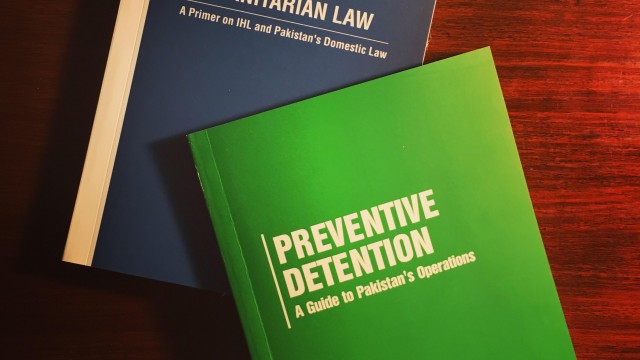Publication Launch on International Humanitarian Law and Preventive Detention
A publication launch was recently held on International Humanitarian Law and Preventive Detention by the Conflict Law Centre, Research Society of International Law (RSIL) in collaboration with the International Committee of the Red Cross (ICRC) in Islamabad.
Lt. General (Retd.) Nasir Janjua, Advisor to the Prime Minister on National Security served as the Chief Guest on this occasion. Other speakers included Mr. Ahmer Bilal Soofi, President RSIL, and Mr. Reto Stocker, Head of Delegation ICRC, Pakistan. The purpose of the event was to showcase two recent publications by RSIL on the legal aspects of military operations in FATA/PATA as well as the legal framework relating to preventive detention in Pakistan.
Lt. General (Retd.) Nasir Janjua appreciated the important contribution being made by RSIL’s research team. He said that such work is of great importance and significance for the State of Pakistan and the Army. He noted that the Pakistan Army complied with International Humanitarian Law principles despite absence of legislative instruments in the beginning but later on the legal instruments such as the Action in Aid of Civil Power Regulations (AACPR), Protection of Pakistan Act (POPA) and others became important to implement the constitutional mandate under Article 245. He congratulated the RSIL team for focusing in conflict law studies given the challenges of non state actors who are waging war against Pakistan.
Earlier, Mr. Jamal Aziz, Executive Director of RSIL explained the objective and theme of the event. He explained the distinction between the law of peace and the law of war and noted that a conflict paradigm applies to military operations being conducted in FATA and PATA. From a legal perspective this paradigm is governed by International Humanitarian Law and Pakistan’s domestic law of war. However, there is a huge capacity gap in Pakistan when dealing with the multifaceted legal challenges arising from its counter terrorism and counter militancy efforts. In order to fill this capacity gap, the Conflict Law Centre was established with support of the ICRC in order to develop unique legal solutions to the various challenges arising from military operations in Pakistan.
Mr. Oves Anwar, Director of the Conflict Law Centre, explained the legal shift that takes place when the state engages in military operations against non-state actors. This shift leads to a disengagement of the human rights protections that exist in peacetime and engage humanitarian protections instead. Without realizing this important difference, the standards and language of critique would not be shaped appropriately.
Mr. Moghees ud Din Khan then presented the publication on ‘Understanding International Humanitarian Law’. He noted the relevance and significance of IHL in the domestic context. He stated that the publication was aimed at scholars, practitioners, members of the judiciary, as well as legislators. He noted that the greatest beneficiary from such work would be members of the armed forces whose international legal obligations were delineated in the publication.
Ms. Maira Sheikh spoke about the publication, Preventive Detention: A Guide to Pakistan’s Operations and highlighted how this guide was intended to add value to the contemporary debate on missing persons and the legal framework that applies to security detentions.
Mr. Ahmer Bilal Soofi, President RSIL, elaborated on the need to increase awareness regarding international law at provincial and district level to ensure compliance. He also commented on the need to enhance Pakistan’s reputation as a responsible state that upholds rule of law. Mr. Reto Stocker, Head of Delegation ICRC, commended the efforts of the RSIL team and pledged to continue supporting research relating to the study of conflict tin Pakistan.
The event, held at the Serena Hotel, Islamabad, was attended by various diplomats, United Nations representatives, high level members of the military as well as members of various think tanks and other stakeholders.


